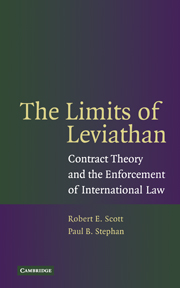Book contents
- Frontmatter
- Contents
- Foreword
- 1 Introduction
- 2 States, Firms, and the Enforcement of International Law
- 3 Lessons from Contract Theory
- 4 A Model of Optimal Enforcement
- 5 Patterns of International Law Enforcement
- 6 The Choice between Formal and Informal Enforcement
- 7 The Future of International Law and Its Enforcement
- Glossary
- Table of Authorities
- Index
4 - A Model of Optimal Enforcement
Published online by Cambridge University Press: 29 July 2009
- Frontmatter
- Contents
- Foreword
- 1 Introduction
- 2 States, Firms, and the Enforcement of International Law
- 3 Lessons from Contract Theory
- 4 A Model of Optimal Enforcement
- 5 Patterns of International Law Enforcement
- 6 The Choice between Formal and Informal Enforcement
- 7 The Future of International Law and Its Enforcement
- Glossary
- Table of Authorities
- Index
Summary
It must not be forgotten that although a high standard of morality gives no advantage to each individual man over other men of the tribe, yet that an advancement in the standard of morality will certainly give an immense advantage to one tribe over another. A tribe including many members who were always ready to aid one another and to sacrifice themselves for the common good would be victorious over most other tribes; and this would be natural selection.
Charles Darwin, The Descent of Man 178–79 (1874)Partners in trade call one another brothers; and frequently feel toward one another as if they were really so. Their good agreement is an advantage to all.
Adam Smith, The Theory of Moral Sentiments, Part VI, section II (1790)The model of optimal enforcement of international law that we develop in this book rests on two methodological building blocks. The first uses the tools of contract theory and the economics of information that we explored in the previous chapter. These allowed us to think more rigorously about the difficulties facing individuals, firms, and states who rely on formal mechanisms to promote cooperation and constrain incentives to defect from jointly beneficial objectives. In this chapter, we introduce the second methodological building block, exploring the allied disciplines of experimental economics, anthropology, and evolutionary theory. Here we analyze the strengths and the limits of informal mechanisms for enforcing commitments and address the central question of the relationship between informal and formal enforcement.
- Type
- Chapter
- Information
- The Limits of LeviathanContract Theory and the Enforcement of International Law, pp. 84 - 109Publisher: Cambridge University PressPrint publication year: 2006



